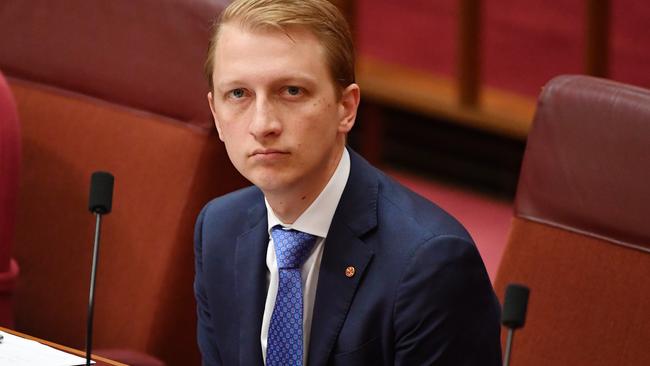Hands off Senate, Paterson tells Abbott
Victorian Liberal senator James Paterson has bluntly rejected a major plank of Tony Abbott’s conservative manifesto.

Victorian Liberal senator James Paterson has bluntly rejected a major plank of Tony Abbott’s conservative manifesto, speaking out against a constitutional change to allow a joint sitting of parliament without first holding a double-dissolution election.
The former prime minister has said the Senate has changed from being a “house of review” to a “house of rejection” and is urging Malcolm Turnbull to hold a referendum to alter section 57 of the Constitution so a joint sitting can be held for a bill if it is rejected twice three months apart.
Mr Abbott and Senator Paterson appeared at the Samuel Griffith Society conference in Perth at the weekend to discuss the Senate, with the backbencher defending the upper house.
“I’m sorry to say, Tony, that I regard your proposal to reshape the Senate as yet another bad idea of constitutional reform,” Senator Paterson said.
“This is because it would fundamentally undermine the role of the Senate as house of review, reducing it to a house of delay.
“Allowing a government to hold a joint sitting of the parliament in order to use its numbers in the lower house to push through any reform that the Senate has twice rejected in just three months would render it toothless.”
Senator Paterson warned that Mr Abbott’s crusade to overhaul the Senate would make it easier for “bad governments to do bad things”.
If the Senate had not rejected former prime minister Kevin Rudd’s carbon pollution reduction scheme in 2009, Labor could still be in power today, he said. Under Mr Abbott’s proposal, Mr Rudd would have been able to hold a joint sitting to introduce his CPRS without first going to an election.
“For me, one of the iron laws of politics is never to give a power to yourself that you wouldn’t be equally happy to see wielded by your political opponents,” he said.
He said the government had managed to get legislation through the upper house, such as the revival of the Australian Building and Construction Commission and legislation to set up the Registered Organisations Commission.
Mr Abbott’s reforms also would be likely to downgrade the value of the Senate committee process, which had often seen important recommendations picked up to improve legislation, he said.
“If we were to implement this reform ... we would lose more than just the Senate’s ability to block legislation,” he said.
“The vital review mechanisms in the Senate, including the committee process, only have weight because every government knows ignoring them could cause their legislative agenda to be derailed.”
In June, Mr Abbott told the Institute of Public Affairs in Brisbane that Senate reform was needed because the next election could not be won by “drawing closer to Labor”, and the only bills likely to get passed quickly were plans to “spend more, regulate more, and put more tax on the so-called rich”.
“The government should legislate swiftly for a referendum to be held concurrently with the next election,” he said.
“This is a recipe for gridlock, not government.”



